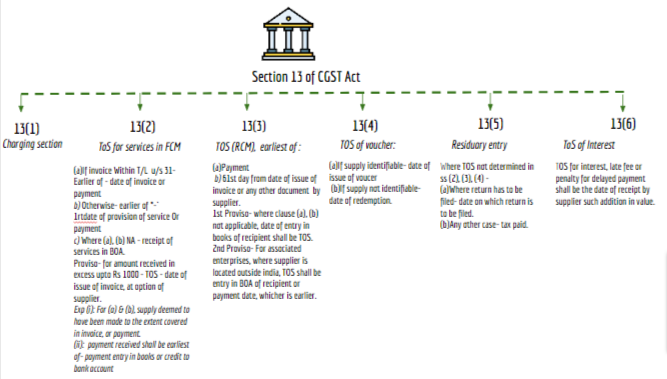Section 13 of CGST Act:Time of supply of services (Updated till July 2024)
Table of Contents
Section 13 of the CGST Act as amended by the Finance Act 2023
Note: Section 13 of the CGST Act is amended retrospectively by Finance Act 2023 with retrospective effect from 1st July 2017. The amended portion is depicted with a different color.
Text on Section 13 of CGST Act :
(1) The liability to pay tax on services shall arise at the time of supply, as determined in accordance with the provisions of this section.
(2) The time of supply of services shall be the earliest of the following dates, namely:—
(a) the date of issue of invoice by the supplier, if the invoice is issued within the period prescribed under sub-section (2) of section 31 or the date of receipt of payment, whichever is earlier; or
(b) the date of provision of service, if the invoice is not issued within the period prescribed under sub-section (2) of section 31 or the date of receipt of payment, whichever is earlier; or
(c) the date on which the recipient shows the receipt of services in his books of account, in a case where the provisions of clause (a) or clause (b) do not apply:
Provided that where the supplier of taxable service receives an amount upto one thousand rupees in excess of the amount indicated in the tax invoice, the time of supply to the extent of such excess amount shall, at the option of the said supplier, be the date of issue of invoice relating to such excess amount.
Explanation.––For the purposes of clauses (a) and (b)––
(i) the supply shall be deemed to have been made to the extent it is coveredby the invoice or, as the case may be, the payment;
(ii) “the date of receipt of payment” shall be the date on which the payment is entered in the books of account of the supplier or the date on which the payment is credited to his bank account, whichever is earlier.
(3) In case of supplies in respect of which tax is paid or liable to be paid on reverse charge basis, the time of supply shall be the earlier of the following dates, namely:––
(a) the date of payment as entered in the books of account of the recipient or the date on which the payment is debited in his bank account, whichever is earlier; or
(b) the date immediately following sixty days from the date of issue of invoice or any other document, by whatever name called, in lieu thereof by the supplier:
Provided that where it is not possible to determine the time of supply under clause (a) or clause (b), the time of supply shall be the date of entry in the books of account of the recipient of supply:
Provided further that in case of supply by associated enterprises, where the supplier of service is located outside India, the time of supply shall be the date of entry in the books of account of the recipient of supply or the date of payment, whichever is earlier.
(4) In case of supply of vouchers by a supplier, the time of supply shall be––
(a) the date of issue of voucher, if the supply is identifiable at that point; or
(b) the date of redemption of voucher, in all other cases.
(5) Where it is not possible to determine the time of supply under the provisions of sub-section (2) or sub-section (3) or sub-section (4), the time of supply shall––
(a) in a case where a periodical return has to be filed, be the date on which such return is to be filed; or
(b) in any other case, be the date on which the tax is paid.
(6) The time of supply to the extent it relates to an addition in the value of supply by way of interest, late fee or penalty for delayed payment of any consideration shall be the date on which the supplier receives such addition in value.
(As given in Section 13 of CGST Act )
charts of section :

 ConsultEase Administrator
ConsultEase Administrator
Consultant
Faridabad, India
As a Consultease Administrator, I'm responsible for the smooth administration of our portal. Reach out to me in case you need help.








